The castle-like hospital campus, designed by Lars Sonck in the early 20th century, is a familiar sight to many natives of Helsinki. “Maria’s Hospital” (Marian sairaala) is among the oldest hospital campuses in Finland. Currently, it serves as the home for startups in the centre of Helsinki. Shortly it will be competing for the title of the largest technology cluster in Europe.
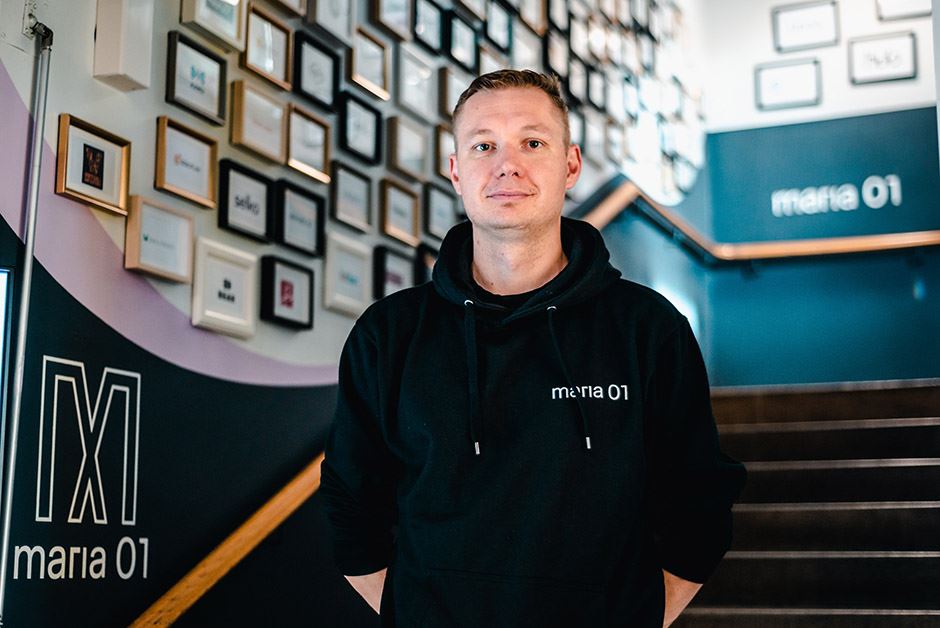
A young man in a hoodie strides into the yard of the opposite building. Your average person on the streets of Helsinki might not recognize him, but he is a familiar face in the local startup scene.
Ville Simola, 34, started his job as the CEO of the largest startup hub in the Nordic countries in the autumn of 2019. His task is to scale-up the current Maria 01 to become the largest startup hub in Europe.
This is not the first time Simola has wrestled a challenge of this magnitude. He is one of the founders of Startup Sauna – the biggest startup accelerator of Northern Europe. The accelerator was shut down in 2018 but, before that, it managed to arrange more than 300 events around the world including Asia and Africa.
This time, however, Simola does not have to start from scratch. Maria 01 has been in operation for three years, during which time the old hospital has become the internationally renowned heart of the Nordic startup scene. The whole field of startups has changed a lot in Finland during the last ten years. The enterprises are better than ever and a record amount of capital has been invested in them – 479 million euros according to last year’s statistics. However, the biggest change has been in the attitudes of people as Finns are much more interested in entrepreneurship now than ever before.
It’s a very different situation from ten years ago when Simola was completing his studies at the Helsinki School of Business (Aalto University).
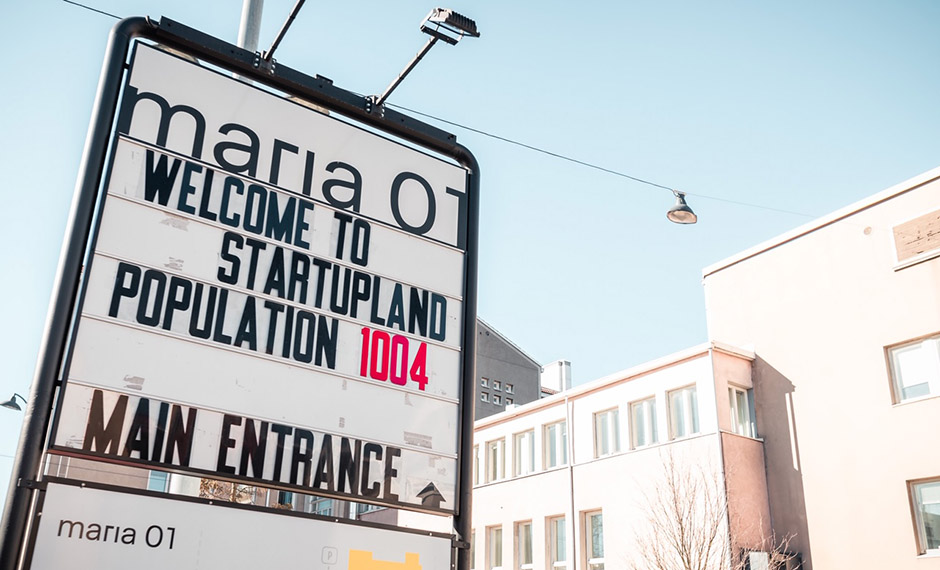
Maria 01 serves as the home for startups in the centre of Helsinki in the old hospital building.
Students as the drive for change
When one skims through the history of startup enthusiasm in Finland, it is often said that the financial plight of Nokia was a catalyst among young adults that created the foundation for the organization of the Nordic startup field. In those days many young people were ready to spread their wings as entrepreneurs, but education in the field of entrepreneurship was practically nonexistent in universities.
“At that time, I was interested in entrepreneurship and I was hoping that the university would have offered practical assistance. However, the courses we had in entrepreneurship consisted mostly of doing cash flow statements and other plans without meeting a single customer,” Simola recalls.
Many of Simola’s friends from college buried their dreams of becoming business consultants or bankers and found themselves working with small but very ambitious startup projects. At that time, these startup projects groups were small, such as Aaltoes (Aalto Entrepreneurship Society) which worked on advancing startups in Finland, and Slush – a technolgy conference for only a few hundred people with the task of alluring international investors to Helsinki.
The Finnish startup field has developed a lot from the early days of Simola’s student activism. The number of players has expanded exponentially, but they were all scattered around different locations in Helsinki and Espoo even as recently as three years ago.
“If a big-time foreign investor wishing to check out the best Helsinki-based startups and meet up with the investors during a single day lands in Helsinki-Vantaa airport, where would they head to?” the question was posed.
When the project dubbed “Maria’s hospital” began, everything was still very uncertain. The project was given a three-year trial period. The founding CEO of Maria 01, Voitto Kangas, personally met with the founders of every single startup that applied for a place at the campus. He spent a lot of time with them, interviewing them, reviewing their revenue and questioning them on their business plan.
The word of Maria’s reasonably priced facilities spread. The first fourteen startups moved into the old hospital campus in the autumn of 2016. The first lines of code were written accompanied by the sound of power drills in the next room. As Kangas handed out new sets of keys to their new owners, he emphasized that they had arrived at a unique place.
“You’re in a special place with a special power,” Kangas joked.
In the course of three and a half years, only 15% of all the firms which have applied for a place in Maria have been accepted. The dusty hospital complex of the early days has grown to be the largest startup-facility in the Nordic countries and nowadays, Simola has the unfortunate task of repeatedly apologizing to the expanded enterprises housed within Maria for the lack of space.
At the same time, the lack of space is what has made the blossoming community spirit of Maria possible. This has also been noted outside of the community. Startup Genome, a global startup report which investigated the world’s networked startup ecosystems, reported that Finland had risen to the top of the list.
“Being physically together enables everything to become much faster. People change their jobs at a faster rate, experts find work quicker. Investments take place faster as the investors are able to follow the startups from a close distance. Everybody else from big corporations, media and foreign investors have found their way here themselves,” Simola says.
Table tennis, adapters and jobs – Finland’s miracle piques interest
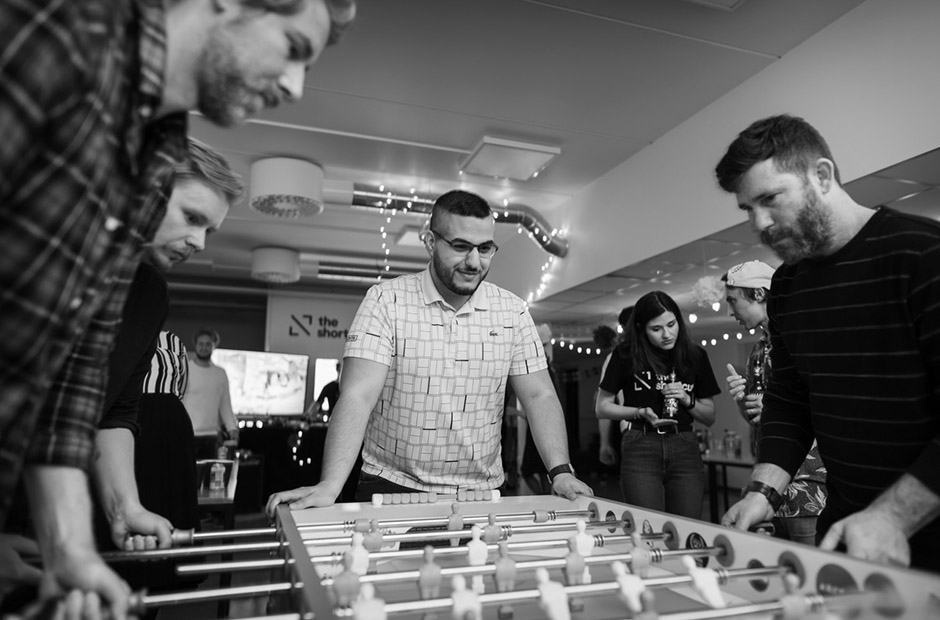
Maria 01 is known for its afterwork community gartherings. Photo by Tapio Auvinen.
According to statistics, there are now more investments made in Finnish startups and early phase venture enterprises than ever. The amount has grown regularly over the last eight years and last year, the number grew especially in the share of foreign investors, who invested 67% of the whole sum. If the forecasts are accurate, the sum will be even larger this year. Wolt, a company that offers restaurant food deliveries, announced this summer that they have raised 110 million euros in funding for growth, making it the second largest capital investment in the history of Finland.
The story of Maria and the Finnish miracle has also spread abroad. Between two and five international groups visit Maria every week. Most of the visitors are from Europe, Asia and the United States. The president of South Korea has recounted the tale of the Finnish miracle, where students started their operation from a hand sanitizer storeroom and lifted the whole country out of the rut of the national post-Nokia depression (Startup Sauna, founded by Simola, started its operation from an old hall in Otaniemi which was used as a storage space for hand sanitizers during that winter).
Currently around 4 000-5 000 new startups emerge in Finland every year. There is still a lot to be done, for if the startup ecosystem in Helsinki would like to compete with the best in the world, London and Berlin, around 10 000 new startups should spring up every year.
This would bring tens of thousands of new jobs in Finland, as well.
Even though venture capitalists in charge of tens of millions of euros along with foreign journalists wander through the hallways of the old hospital campus, people who work at Maria face the same mundane challenges as everyone else.
“Macbook chargers and adapters seem to go missing continuously. The peer-to-peer doggie day care center in Maria is very busy as well. Currently, there are tournaments being held for the Maria championships in table tennis, pool and chess.”
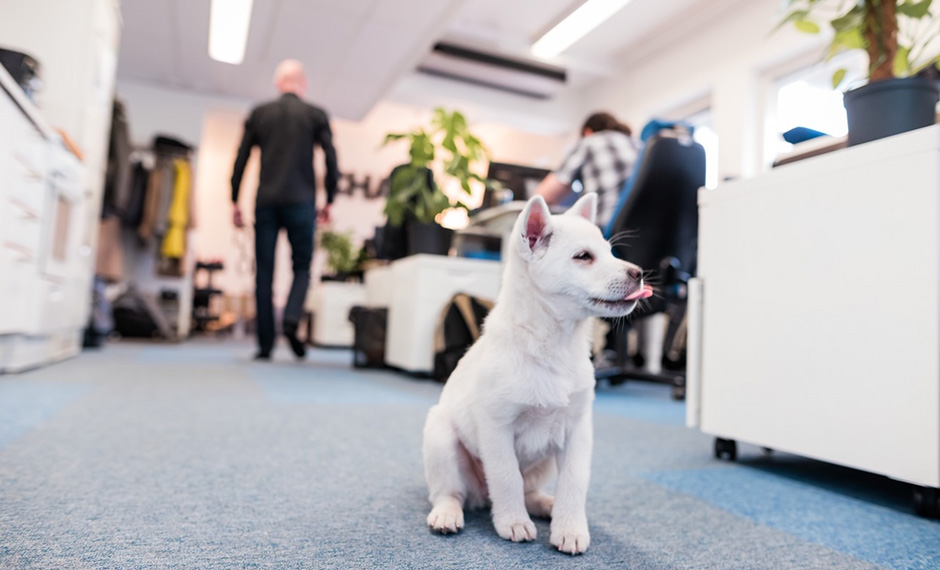
Maria 01 hosts also peer-to-peer doggie day care centre. Photo by Tapio Auvinen.
Apart from their everyday operation, Maria 01 also runs Finland’s largest startup job market platform, a service called Hub.fi. The most sought-after employees are currently coders.
The admissions quota for schools that provide education in ICT has been increased rather conservatively. The need for coders keeps growing faster than their numbers.
“We need really good companies that can actually compete with giants the likes of Amazon, in providing interesting jobs. Then these companies will lure the best experts here. It all relies on our ability to build these companies,” Simola explains.
Another issue that Simola says gets very little attention is Finnish work and leadership culture. “People who have moved here have enjoyed the Finnish way of combining work with other aspects of the everyday life. Furthermore, the culture of leadership in Finland is based on trust and low hierarchy. This is a clear competitive advantage.”
The most important technology expertise in Finland will be housed within Maria 01 campus
The original plan of the Maria project was to populate all of the 20 000 square metres. Now, the size of the facility will possibly be even tripled in an expansion project by YIT and KEVA. Kangas and his partners have managed to build a facility that houses top Finnish technological and financial expertise. After the extension Maria 01 will compete for the title of the largest technology campus in Europe – as well as compete with likes of large development centres like Facebook, Amazon and Google if one measures how many coders are housed within a square metre.
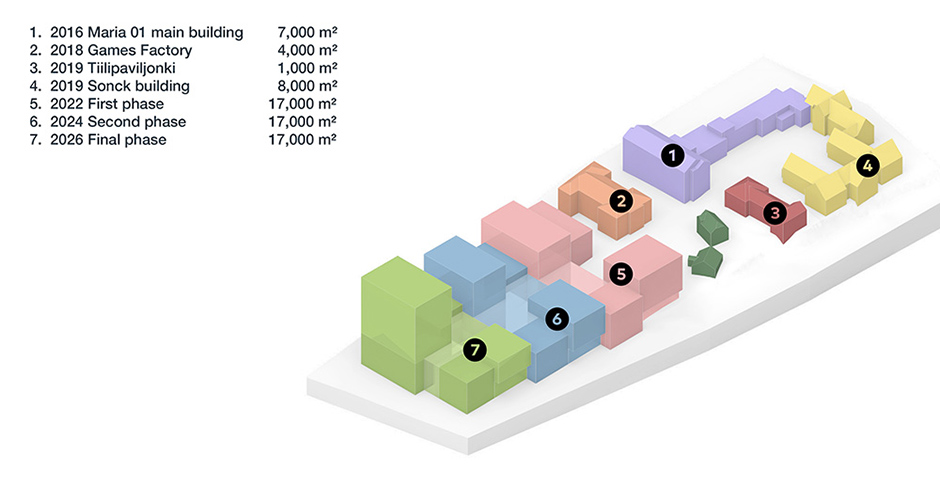 After the extension Maria 01 will compete for the title of the largest technology campus in Europe.
After the extension Maria 01 will compete for the title of the largest technology campus in Europe.
"Many of the startups have had to embark to a different location after staying here for one to three years as their teams have grown and we have not been able to provide them with larger facilities. Almost all of them would have loved to stay longer. Our new campus makes it possible for these companies to stick around Maria for longer."
For a fast-growing company, searching for new facilities, renovating them and moving in takes months of work and is a big investment. Within Maria, all this takes about a week.
Maria 01 is centered around early phase startups and investors, but in future, the campus will also be able to offer facilities for more advanced enterprises and investors. Services regularly used by growing companies, such as law firms, think tanks, accelerators and marketing agencies, will be housed in the same address.
As the amount of square metres increases, the internal culture of Maria also has to be scaled. In future, the championship games in table tennis might have to be arranged between different buildings. According to Simola, the key for successful scaling lies in uncompromising criteria for quality. “Our team is world’s best at doing exactly this and our most important task is to make sure that different kinds of entities are able to function under a single roof and create synergy in doing that.”
Simola thinks it is crucially important that the atmosphere and communal spirit of Maria is maintained as the campus grows. “I see the whole group as a village community where everyone wants to help each other and shares an equal degree of determination.
Maria´s area is developing into one of Europe´s largest startup campus. Follow the Maria´s area development journey with this series of stories. Stay tuned and subscribe to our newsletter!






